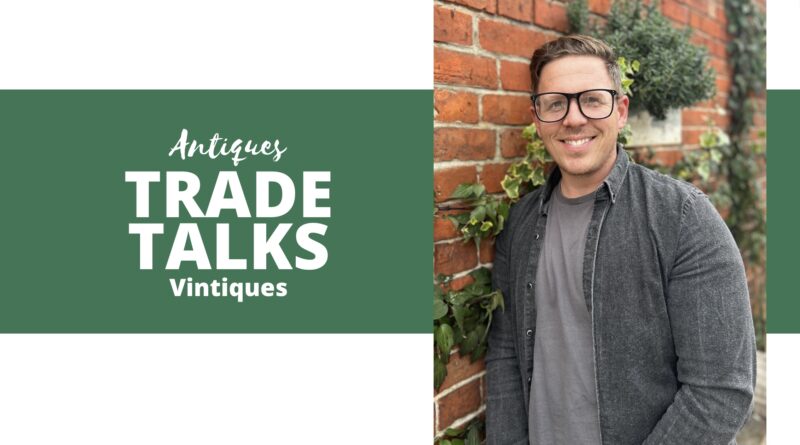Antiques Trade Talks – Vintiques
Luke Brammer is the owner of Surrey-based Vintiques, dealing in anything from the 1970s and earlier. We caught up with him for a quick chat about his life in the antiques and vintage business
 How did you get started in the world of antiques and homewares?
How did you get started in the world of antiques and homewares?
I’ve always had a passion for avoiding landfill after realising how many people were just throwing away our history, from furniture to ephemera, coupled with an interest in antiques. I made it my mission to make a dent in what we throw away as a nation. With my house clearance company Clearance Grafters and shop Vintiques of Surrey we’re doing our bit!
What is the unique selling point of your business?
We can guarantee ALL our stock is fresh to the market as 70% is from our house clearance company the rest is purchased privately rather than passed around trade.

What areas/items are currently in demand and why?
The midcentury market is still strong, however we’ve seen a huge demand for vintage clothing, both men’s and women’s.
What do you think will be in demand in the future?
We’ve seen a slight increase in sales and interest in our antique section, it would be great to see prices and sales rise in this market.
How can antiques and vintage items work well in traditional and contemporary settings?
If done right this can work well, perhaps have a larger piece from the 1960s and add small antique items, such as antique lever bound books, this can really flow well.

What items do you have at home/collect and why?
I don’t have many items at home, however I have a collection of ‘not-for-sale’ items in my office which holds the weird and wonderful.
Do you think any pieces being produced now will be the antiques/vintage of the future?
Sadly, we’ve grown into a throw away society, most furniture isn’t built to last and most won’t survive 50 years. However you will see things like electronics (computers, phones, etc) becoming highly collectible vintage and antique products.
How is the antiques and vintage industry changing and are you optimistic for its future?
I’ve not been in the industry long for but I’ve already seen so many dealers cease trading. You will see even more focus on social media platforms with less footfall in shops. If you are not active on social media you may see a decline in sales.

How is new technology good for buyers/collectors?
We created a strong following on our social media platforms, in particular Instagram, and we sell more here than we do via our website.
Tell us some trade secrets – what key things and question should buyers consider and ask?
I’d always ask if the seller has any history about the item, where did they get it from, who owned it, how did they get hold of it. To me, it can make the piece more desirable knowing its history.
What antiques/vintage pieces would you buy if money were no object?
I’m a sucker for old enamel signs of all shapes and sizes, if I had money and space I’d love a vast collection of unique and rare signs.

You’re down to your last 50 quid – what antiques/vintage items would you buy?
Something which is giving a return and will increase in price over time, perhaps jewellery or artwork.
Where are your favourite hunting destinations and fairs – why those?
We rely heavily on private house calls, this way we can guarantee our stock is fresh to the market.
What are some of the biggest mistakes that buyers make?
Is the antique and vintage marketplace attracting younger buyers?
We’ve noticed that at least 50% of our clientele are younger, perhaps early 20s to mid 40s, so it’s great to interact with a younger crowd who are as enthusiastic as I am.

How can the industry attract more younger buyers?

